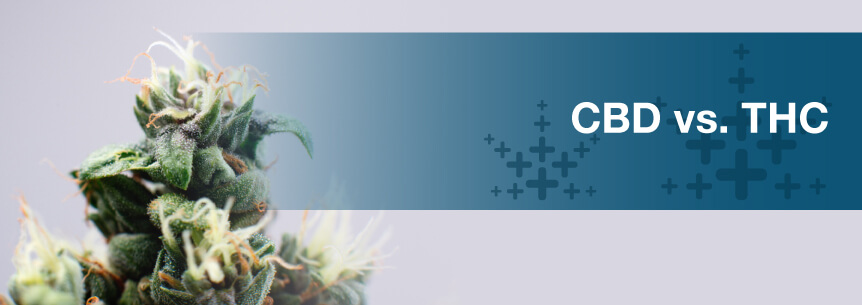
THC and CBD are the two most abundant cannabinoids found in marijuana. Both of them interact with your endocannabinoid system, but each has its own unique and natural effects. Below, you’ll learn more about CBD vs. THC, find out about the similarities and differences between the two, and see how they work beautifully together to provide relief from a variety of conditions and symptoms.
CBD, which refers to cannabidiol, is a chemical compound that comes from the cannabis sativa plant. It’s one of the plant’s many compounds and is a high-concentration cannabinoid.
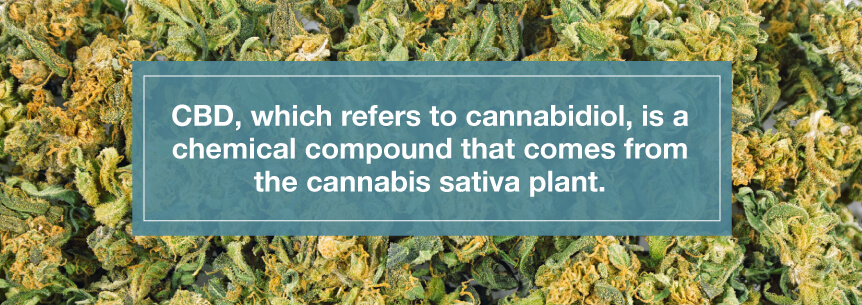
Cannabinoids are part of your endocannabinoid system (ECS), and they actively bind to certain cell receptors in your body. Your ECS is a large cell receptor proteins network with a wide range of functions. You have receptors throughout your body, such as in your:
Your ECS system controls processes such as your:
Refer to our Cannabidiol (CBD) Guide for more in-depth information on this cannabinoid.
Tetrahydrocannabinol (THC) is probably the most well-known chemical compound in the cannabis plant. All marijuana varieties contain THC — however, some are more dominant in THC while others contain very little. When you consume THC, it binds to your brain’s and central nervous system’s cannabinoid receptors to produce a euphoric effect.
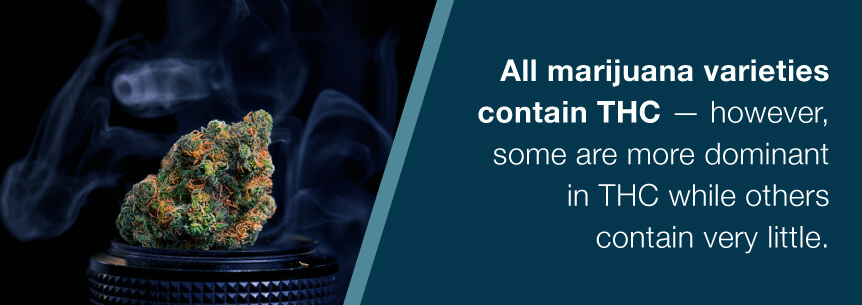
Your brain’s cannabinoid receptors work with your body’s naturally-occurring endogenous cannabinoids. When abundantly produced, natural cannabinoids induce a mildly euphoric sensation similar to the effect of intense exercise. THC intensifies this sensation by inserting itself into this natural euphoria pathway.
Cannabinoid receptors are associated with your:
Uncovering THC at your receptor sites affects these functions. The exact effect depends on what natural cannabinoid level you have in your system, how much THC you consume and various other health factors.
Refer to our Tetrahydrocannabinol (THC) Guide for more in-depth information on this cannabinoid.
CBD and THC are the two most prominent marijuana compounds. Although they’re only two out of over a hundred other cannabinoids in the cannabis plant, they make up the biggest quantities throughout the diverse varieties of the plant. A variety of medical weed strains are made of both cannabinoids so they can complement one another.
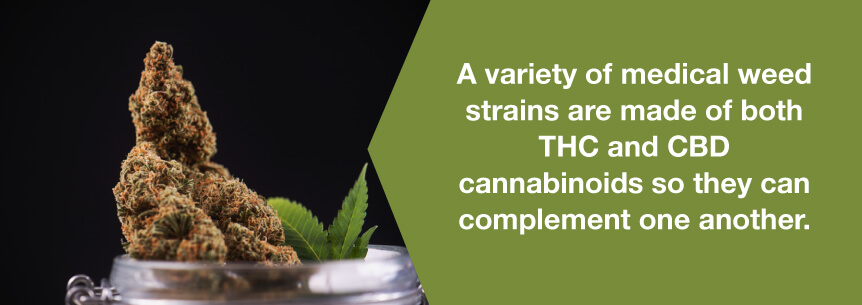
While at first it might seem CBD and THC are completely opposite, they share some things in common — including how they grow and interact with your endocannabinoid system.
THC and CBD are both developed within trichomes (plant outgrowths). These grow on the cannabis plant’s flowers and are small, mushroom-like structures. There are three primary species of the plant:
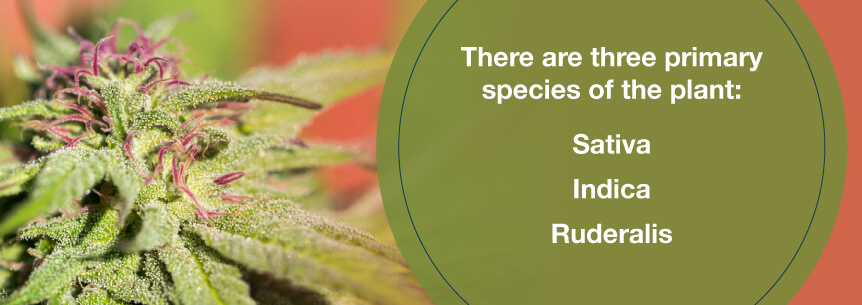
Each one of these three species, as well as the distinct strains within them, contains different THC and CBD percentages. Budtenders over the years have bred strains to maximize both CBD and THC content. For instance, the Charlotte’s Web strain is high in CBD content, whereas Bruce Banner #3 is loaded with THC content.
The chemical makeups of CBD and THC mimic the endocannabinoids of your body, allowing them to interact with the cannabinoid receptors of your ECS to alter the release of brain neurotransmitters. Both THC and CBD interact with your endocannabinoid system to regulate various functions in the body such as:
While there are similarities between the two cannabinoids, clear distinctions do exist — including how they’re used and the nuances of their psychoactive effects.
Although it’s well-known that THC causes you to feel “high,” many patients value CBD for its medical and non-psychoactive effects. THC produces the mind-altering, euphoric effects of the plant. This is because THC binds to your cannabinoid 1 (CB1) receptors found in your brain and changes how it functions — leading to the “high” feeling.
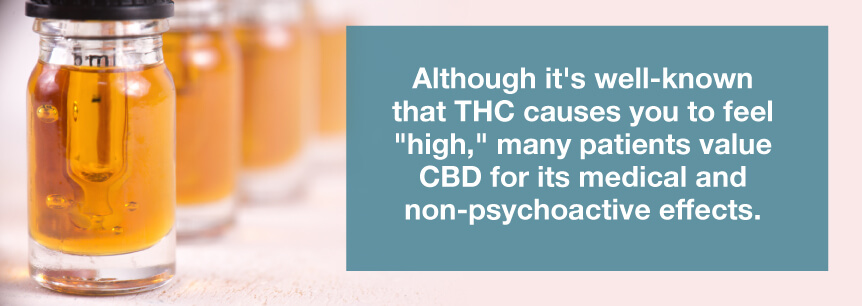
CBD doesn’t bind to your CB1 receptors. Therefore, it doesn’t produce the same psychoactive effects THC does. But CBD does affect the physiology of your brain and body. Studies show CBD could work as an antipsychotic and a mild antidepressant because of the way it interacts with your brain’s relevant receptors. Researchers also found CBD functions in over 60 various molecular pathways.
You’ll find both THC and CBD throughout the stalks, seeds and flowers of both marijuana and hemp. Both exist in marijuana plants in a wide array of magnitudes. However:
However, CBD exists in hemp in higher quantities, while THC heavily saturates cannabis. Because hemp has greater CBD content than THC, it’s a useful source of CBD for medical marijuana.
Many growers cultivate cannabis to maximize the THC content in it. Throughout the years, growers have been cultivating and cloning marijuana with specific emphasis on increasing the concentration of THC and producing stronger and more intoxicating effects.
Some of THC’s most common effects include:
Some of CBD’s common uses include:
As you can probably see, while THC does have some medicinal purposes, CBD rules that department.
THC’s psychoactive properties may cause temporary side effects, including:
According to the National Cancer Institute (NCI), although THC does pose some risk of adverse side effects, you can’t die from overdosing on it. Certain studies prove high THC marijuana strains could lead to long-term negative psychiatric effects if adolescents consume it. It could also increase the risk of schizophrenia and other psychiatric disorders.
Other studies show CBD, even with large doses, is safe and well-tolerated. Users have reported some side effects such as:
Other research examines the side effects and safety of CBD and concludes CBD appears safe in animals and humans. According to the research, even chronic human users of CBD showed no type of negative psychiatric, neurological or clinical effects.
Both THC and CBD provide people with positive effects on their own, but when you combine them together, even more benefits can happen. THC and CBD together can:
The interaction of marijuana compounds like CBD, THC and terpenes to produce different physical effects is known as the entourage effect. The entourage effect is essential for causing some of the physical effects associated with marijuana.
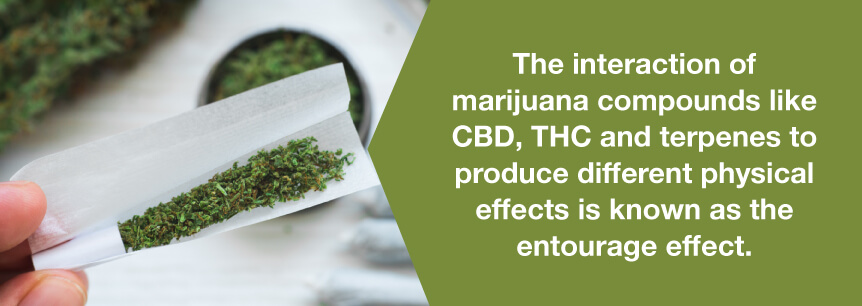
For instance, CBD mitigates psychosis symptoms while THC is the perfect therapy for chronic pain. In other words, you don’t expect to experience any relief from psychotic disorders by substituting THC for CBD. In this regard, the two of them aren’t interchangeable. And even though you may use CBD and THC to treat similar conditions, you can only experience the unique and specific effects we mentioned earlier by using one or the other.
However, combine the both of them and you instantly have a whole range of new therapies and effects available to you. For instance, combining CBD, THC, terpenes and other medical pot compounds makes it possible to treat conditions such as:
The terpenes and cannabinoids by themselves, however, don’t produce these same effects. Essentially, you create this “synergy” through their combination.
Synergy is when two or more substances or other agents interact and cooperate to produce a combined effect that’s greater than the sum of their separate effects. When you push a component like THC too high, or isolate a component like CBD at the other components’ expense, you can reduce their beneficial effects.
Since CBD is a completely organic and natural product, it acts as an attractive alternative to standard medicine for a wide range of health problems like:
The chances of experiencing any negative side effects with it are low, making it a safe solution. Nevertheless, there are some pros and cons of CBD to bear in mind as you weight your treatment options.
The medical community is only now discovering the huge variety of benefits of CBD. Some substantial health advantages of consuming CBD are as follows.
Endocannabinoids keep memory, mood and energy balances inside optimal parameters. The same CBD-activating receptors also trigger the endocannabinoid’s response. Medical research shows CBD may take part in determining if the endocannabinoid system increases receptor function to enhance mood while reducing depression and anxiety. CBD is a more appealing alternative than other measures for managing memories of traumatic experiences.
Some research supports the notion that CBD improves the condition of joints, muscles and other organs because it balances mood and reduces pain levels. The medical community recognizes CBD as a natural pain reliever. Patients often use CBD to treat their cancer or fibromyalgia.
Chemo can be painful and those individuals undergoing this treatment can use as much help as they can get to help them deal with the associated pain. During another study involving chronic pain, patients reported a reduction in their pain level after only a couple weeks of CBD treatment.
Consuming CBD releases hormones that control hunger. If your ECS system becomes stressed by illness, medication or both, it can reduce your desire to eat. CBD restores this desire to eat in sick patients and helps them fight the disease by strengthening their bodies.
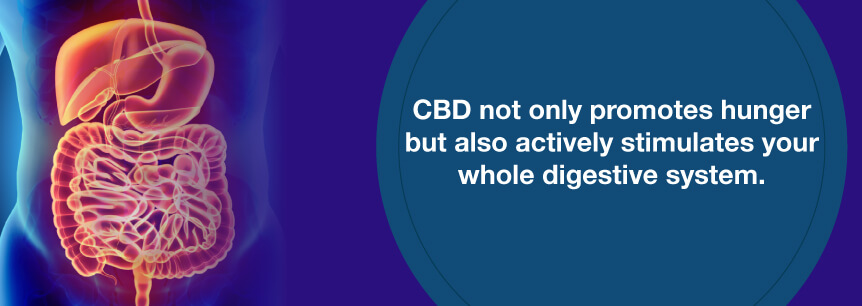
CBD not only promotes hunger but also actively stimulates your whole digestive system. That’s good news for those who are trying to regain weight following a period of severe sickness. In fact, CBD is often used to treat anorexia and obesity.
As you age, your brain does as well, which naturally reduces its performance. A study of the impact of CBD on brain activity indicated that CBD could eliminate the accumulation of free radicals in the brain. You can’t avoid free radicals entirely, however, since they’re the result of such things as:
When CBD removes the free radicals’ negative effects in your brain, it refreshes the functions of your brain and improves the cells’ longevity.
These are only some of the many advantages of CBD. Some others may include:
Although there aren’t many, you will find some cons of CBD to keep in mind as well.
Some people experience side effects from CBD. The side effects, however, tend to vary from one individual to another based on their genetic predisposition and dosage:
CBD causes inhibition of hepatic drug metabolism and a decrease in p-glycoprotein activity in some people. CBD may interact with some medications and treatments.
Also, in response to CBD use, cytochrome P450 (liver enzymes) reduce their activity. These liver enzymes are extremely important for your body to function properly, since they are responsible for metabolizing the medications you take to treat your health condition.
Some individuals report dry mouth after administering CBD. It’s only a minor side effect involving the endocannabinoid that reduces saliva production.
3. Increase Some Symptoms of Parkinson’s Disease in High Doses
When it comes to CBD’s effect on treating Parkinson’s disease, there are contradictory results. According to some research, CBD may increase muscle movement and tremor intensity in high doses. Others show the body tolerates CBD well and may be beneficial in treating Parkinson’s disease or similar diseases.
You can find nearly endless amounts of information online and around the globe regarding marijuana and its well-known cannabinoid, THC. Although not all people can tolerate THC, some do truly benefit from its effects. They find it helps their mind, body and overall health. Some even say it helps their spiritual health.
Some individuals report THC is challenging to take because it doesn’t “sync” well with their body and body chemistry for several reasons. Below are the pros and cons of THC.
Some pros of THC include:
THC acts as a potent medication for your mind — especially for relieving anxiety, stress and depression. What’s important, however, is the strain you choose. Pick the wrong strain and you could actually increase your anxiety. User reviews can be helpful with this. Indicas and hybrids tend to cause less anxiety and paranoia, but that doesn’t mean you can’t find an amazing sativa strain, because they’re plentiful.
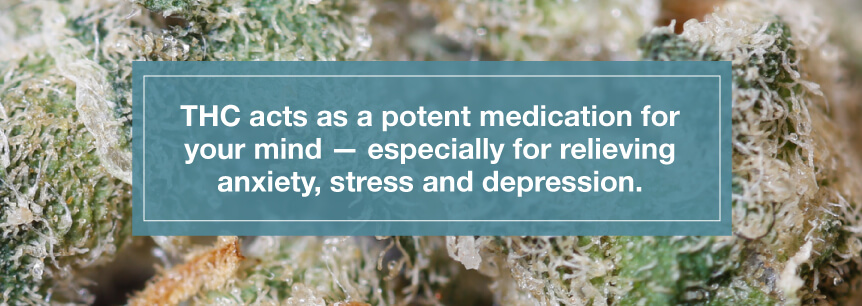
Cancer, for many, typically means chemotherapy or radiation. Both procedures can leave you with:
THC can help diminish these and other symptoms of radiation or chemotherapy.
Some medical weed strains help to make you extremely social and outgoing. Others help provide you with energy and enhance work focus. THC, when you choose the right strain, has this incredible effect on many users. Sativas are generally your best choice for energy and focus enhancement — however, a good indica or hybrid could work great for a social get-together or for an evening kicking back on the sofa.
Some cons of THC include:
Nearly all marijuana strains come with the potential to produce negative side effects. Most strains cause red and dry eyes and dry mouth, both of which are managed easily. But in some cases, when taken in high doses, THC could produce anxiety and paranoia and increase the fear response — especially in those who already suffer from a mental condition or mood disorder.
Some people report experiencing dizziness, nausea and headaches, but these are only temporary. If you happen to react like this to a certain strain, just try a different strain or opt for a CBD-rich strain instead.
Red and dry eyes and dry mouth (a.k.a. cotton mouth) are the most common, but least serious, negative side effects when consuming THC. While uncomfortable, they’re managed easily.
Some studies show consuming THC — especially smoking it — may result in short-term memory loss and problems thinking.
So what does CBD treat? Here are some potential medical benefits of CBD:
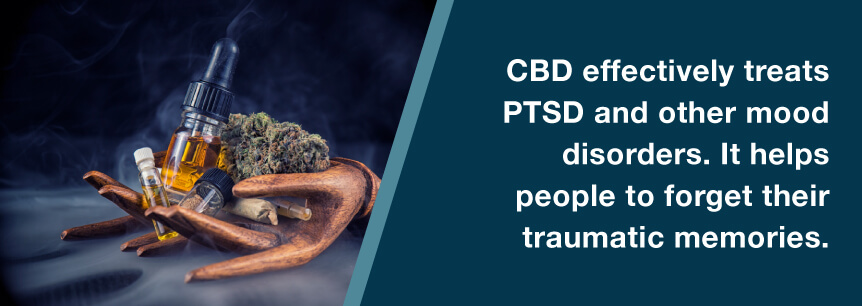
There are potential medicinal benefits of THC as well, including:
When you first begin using CBD, it could overwhelm you when you’re trying to figure out what products are out there and how you should take them. The good news is, since CBD is in growing demand these days, you’ll find a whole range of CBD products to pick from, like tinctures, liquids, capsules, chews and topicals.
With this, you’ll also have more choices in the delivery method. Some methods of consuming CBD include:
Gaining the physical and mental advantages of THC in medical marijuana depends on how you consume it. Each delivery system provides you with a host of effects and unique experiences. Some effective methods include:
Whether you’re looking for more information on CBD vs. THC, searching for a medical marijuana doctor? We have you covered here at MarijuanaDoctors.com. Be sure to sign up for our newsletter, too, so you’re always up-to-date with the latest information about medical weed products plus developing news about the legal and regulatory landscape in your state.